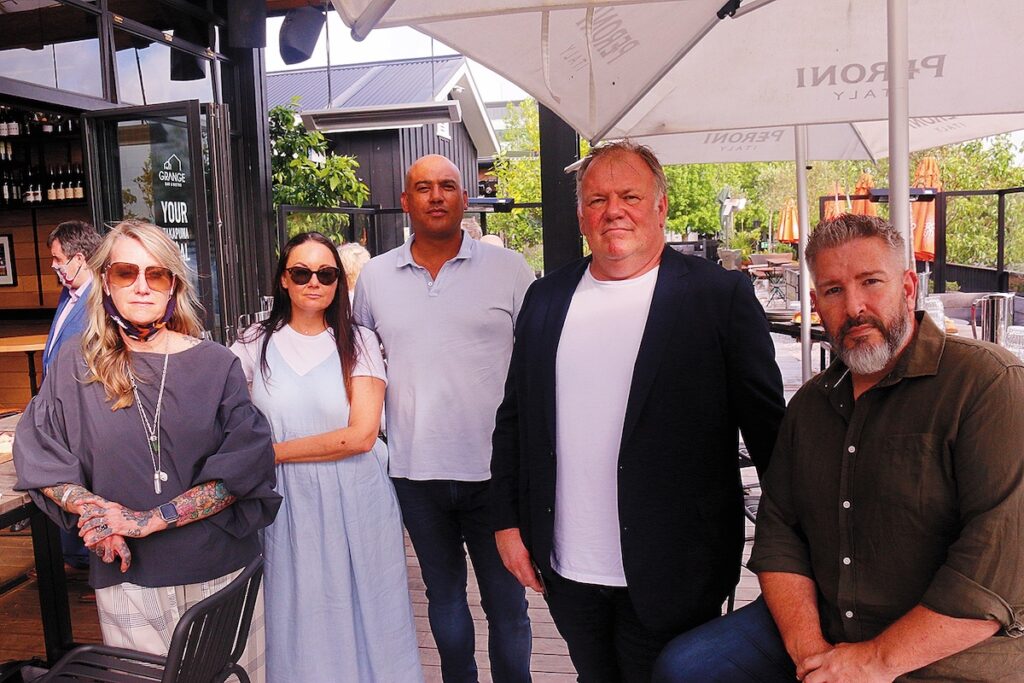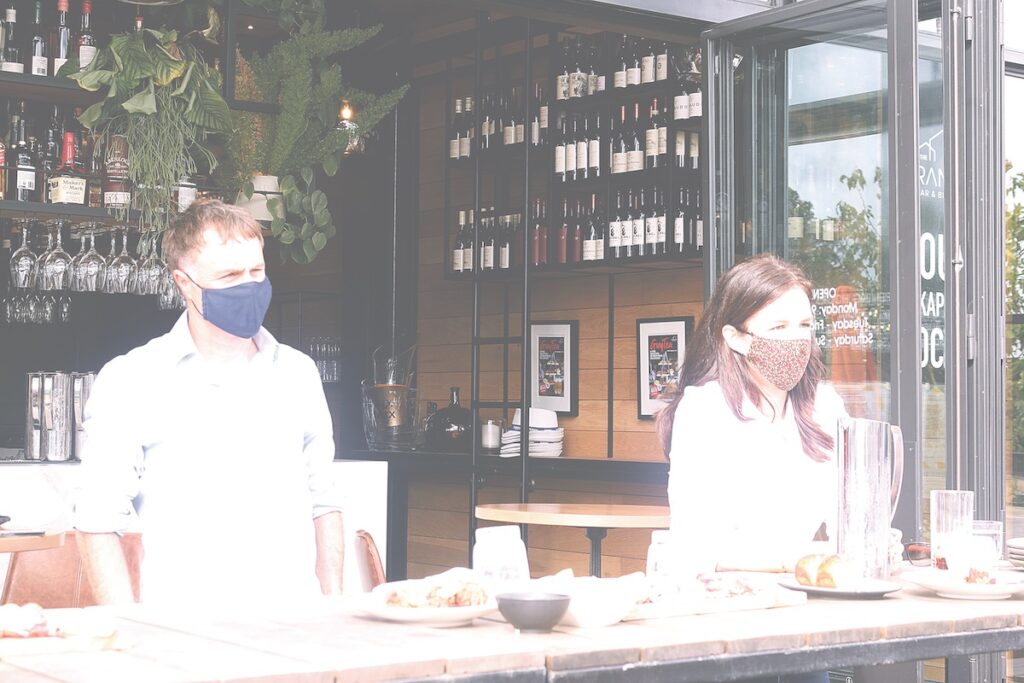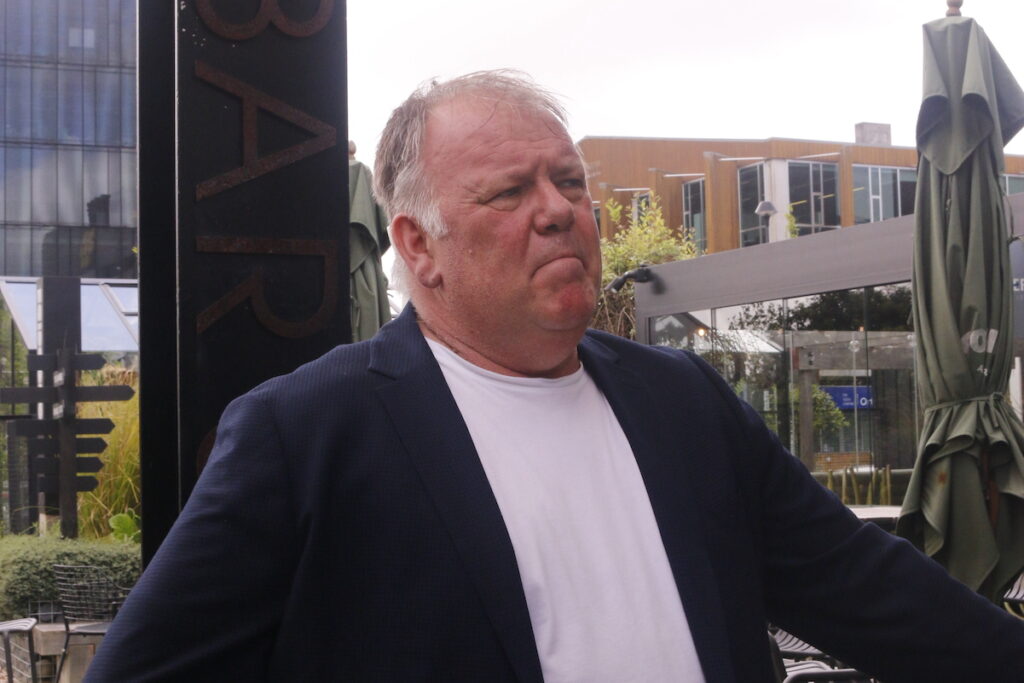What's New
25 November, 2021
Business owners vent frustration – and fears

Forgotten, frustrated and fearful – those are just a few of the words business owners hit hardest by the lingering lockdown use to describe how they feel.
Leading Takapuna hospitality owners and a popular hairdresser expressed their anger and angst at a recent forum at Smales Farm.
“It’s absurd. No one knows what is going on,” said Jennifer Morgan, of the Morgan & Morgan salon. “It didn’t need to be this hard.”
Steve Schute who owns the Elephant Wrestler on Hurstmere Rd and Regatta and Francs bar on The Strand said the industry was all about compliance, but it was not being trusted. “We’d be safer than the supermarket – they’re open.”
His losses were running at $50,000 plus a week, but he could not take forward bookings for functions because he had no idea when these could be held again. With 95 staff across three venues he worried about how to get them back and keep them motivated.
A city bar owner at the meeting, Sam Ansley of Everybodys and Roxy, said hospitality was being treated as pandemic “collateral damage”. Morgan described the description, which she had heard before, as “soul destroying”.
Service industries were not valued and were written off as low-wage employers, said another attendee.
Ansley said rule changes and drip-fed information were adding to the pain, reflecting Wellington’s lack of understanding about the cultural value of hospitality and the depth of damage it had sustained in Auckland.
Another city venue owner said a paint-by-numbers approach to support meant that businesses down 40 per cent in turnover qualified for the same subsidy as those down 100 per cent.
“Everyone feels pretty neglected. We just feel like the forgotten industry,” said another.

The gathering took place outdoors at Smales Farm, with convenor and North Shore National Party MP Simon Watts saying it was designed to be small and “picnic-style” so as not to breach regulations.
The owner of The Grange, Mark Wilson, served up nibbles on his venue’s deck, in lieu of having it open to the customers he is desperate to welcome back next month.
Hearing the Prime Minister dismiss a quick change to allow more al fresco dining as “not viable” had hacked him off, he said. “Having no income for 13 weeks is not viable.”
Two key themes emerged from the nearly 20 people attending: the need for government support to carry through the first quarter next year and worries about policing vaccine mandates.
Several people spoke of concerns about anti-vaxxers disrupting trading or challenging staff. One owner said he had already been threatened online. “People are going to guerrilla warfare our venues,” said Schute.
Watts said he would return to Wellington to continue to push the government on its Covid-19 pandemic management and delivery.
National’s Covid-19 spokesman, Chris Bishop, also attended, as part of a day in Auckland visiting hospitality businesses.
He slated Labour over its slow pace in rolling out vaccine passports and approving rapid testing. National supported a $100 voucher for vaccinated people to dine out, he said.
East Coast Bays National MP Erica Stanford said the party was pushing for visas for foreign staff.
University of Auckland emeritus professor of medicine Des Gorman told attendees restrictions should already have been loosened for fully vaccinated people.
But it was the raw messages from the series of speakers that rang the loudest.
Wilson said he wasn’t a soft guy, but his staff were struggling and “I am too”.
“Then we’re possibly going to have protesters out here because we’re a vaccination pro-venue, because we have to be to reopen.”
Morgan told of her savings draining away. “Every single second we aren’t open is a cost.”
With 700 clients she had rescheduled appointments on multiple occasions, but some days when she thought of her beloved salon “I feel like burning the place down.”
Hospitality business owners from Half Moon Bay, Gina and Clinton Henry, said things had got so bad that their young son had offered his upset mother $10 from his piggy bank. After 10 years building a business they were now selling assets to keep it afloat..
In developing Smales Farm, Greg Smale told the Observer that hospitality had always been at the heart of the vision, to ensure the commercial and soon-to-be residential centre attracted people. “You need good operators – it sets the tone for the area. If you don’t have good hospitality the city is dead.”
As a landlord, he had assisted with rent relief, despite having lost big tenants himself, including Air New Zealand, due to Covid.
He was frustrated by inconsistent decision-making, which meant some businesses could not trade at all, while others were virtually unaffected.
His wife, Felicity, said hospitality was a more of a skilled industry filled with passionate people than it was given credit for.
Hairdressing was another under-appreciated service industry. She felt for stylists having been out of action for so long.
“The hairdresser gets one cut, instead of three.”
Al fresco venue owner: down $2m… and counting

Mark Wilson fears a pre-Christmas exodus of Aucklanders will kill off any “sugar rush” of customers from a December reopening of his Takapuna restaurant and bar.
At this time of year, he would expect his Smales Farm venue, The Grange, to be pumping.
Christmas parties make November the busiest month, closely followed by December, when people typically enjoy catch-up drinks.
But with the border set to reopen mid-month under the traffic light system he is not sure how things will pan out.
If cooped-up Aucklanders flocked to Omaha or Queenstown, then there might only be a fortnight of good cheer in the city, with no way of recouping what had already been lost.
“My best guess is we would be trading at 50 to 55 per cent of normal revenue,” he said. “By the time we come out of lockdown in December we will have just a fraction over $2 million wiped off our revenue.”
On top of not making money since lock-down began in mid-August, with every month that has gone by Wilson has been putting $23,000 into the business just to keep it ready to reopen.
With plenty of outdoor seating, The Grange is ideally set up for Covid-era wining and dining, but the red-light cap of 100 people in a venue when he could fit more than three times that number in varied separate spaces will constrain the business bounce-back.
A frustrated Wilson said that even when the red light changes to orange it does not signal much moving forward for hospitality, because government financial support will be lost while trading restrictions remain, potentially after New Year which is when the business is at its quietest. “But there are no clear dates,” he said, emphasising the corrosive effect of the uncertainty. “If we’re still restricted [under orange], with no support whatsoever, I’d probably rather be in red [than orange] and wait because we can get the subsidy.” Wilson believed the traffic light should already be green.
If the Government had moved Auckland to step three of Level 3, rather than waiting to shift the whole country to the traffic light system, it could have allowed more people in venues than the red light will, he says.
“We’ve got 1000 square metres of liquor licence area, with 750 of that outdoors.”
Health expert Professor Des Gorman had assured him this was the safest place for socialising, yet he was unable to use his two large deck areas to full capacity, let alone his indoor dining areas.
Wilson is thankful, however, that he is able to spread tables out more than street-side venues. They are keen to expand their al fresco dining footprint, but are waiting to hear if Auckland Council will waive fees in December.
“They’re running out of time to sort the outdoors component.”
Board backs waiving of outdoor dining fee
Waiving fees for dining al fresco to boost North Shore centres post-lockdown has the backing of the Devonport Takapuna Local Board.
Board member George Wood told a board meeting last week that Auckland mayor Phil Goff had talked about allowing bars and restaurants to use footpaths for dining al fresco without paying fees. “Takapuna’s going to have to be an area that we’re going to have to nurture back to [its] former self,” Wood said. The centres of Milford and Devonport were added to his motion.
An Auckland Council spokeswoman said all existing outdoor dining licenses will be automatically extended, without cost, until Auckland returns to alert level 1, or the green traffic light level, or until 18 February, whichever is earlier.
The outdoor dining license fee costs $382, with an annual rental on top. But the council could not do the same with alcohol licenses as it is constrained by the Sale and Supply of Alcohol Act.
The Rangitoto Observer can be downloaded online here.

Please consider supporting The Rangitoto Observer by clicking here:

